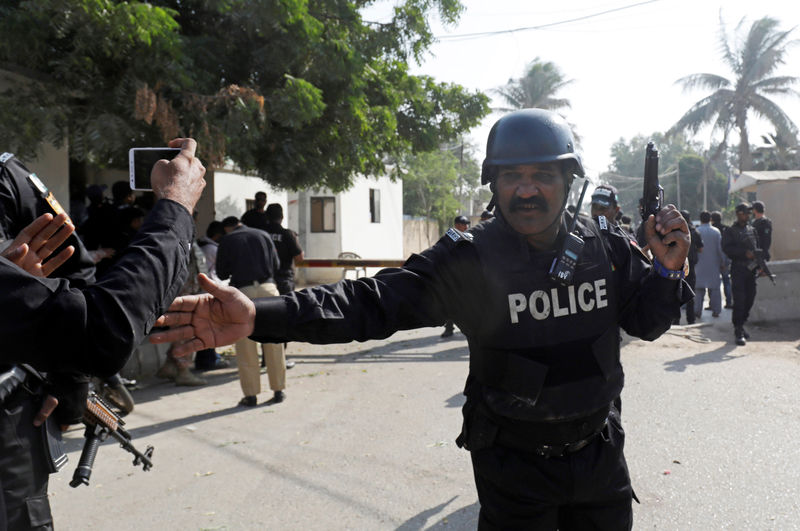KARACHI, Pakistan (Reuters) – Three suicide attackers stormed the Chinese consulate in the Pakistani city of Karachi amid a series of gunshots and an explosion on Friday, but were killed before they could get into the building in a car packed with explosives, police said.
At least two police officers were killed in the attack, which was claimed by the Baloch Liberation Army (BLA), a separatist insurgent group that opposes Chinese projects in the resource-rich southwestern province of Baluchistan.
All Chinese staff at the consulate were safe, Pakistani Foreign Minister Shah Mahmood Qureshi and China’s foreign ministry said.
The assault was the most prominent attack in Pakistan against China, a neighbour and close ally which is pouring billions of dollars into Pakistan as part of its Belt and Road initiative.
It was also the highest-profile operation in years by the BLA, which mostly wages a low-level insurgency in Baluchistan. The group also calls itself the Balochistan Liberation Army.
Prime Minister Imran Khan ordered an inquiry, with his office calling the attack “part of conspiracy against Pak and China economic and strategic cooperation”.
As the attack unfolded, an explosion and gunshots rang out in Karachi’s affluent Clifton neighbourhood, where the consulate is located, and a plume of smoke rose over the area.
Karachi police chief Amir Shaikh said the three attackers came in a car filled with explosives but failed to get inside the heavily fortified compound. It was not clear if the car had exploded.
“They tried to get inside, but the Rangers and police killed one of the terrorists,” Shaikh said.
A gun battle broke out with the two other attackers trying to enter the consulate’s visa section, but they were also killed, he said.
At least three cars parked near the embassy were destroyed in a blast. A helicopter hovered over the area for hours after the attack.
INSURGENCY

A spokesman for the BLA confirmed there were three attackers.
“They stormed the Chinese embassy in Karachi. China is exploiting our resources,” spokesman Jiand Baloch told Reuters by telephone.
The insurgents are based in Baluchistan, where China has funded development of a deep-water port in the town of Gwadar, and is also funding other projects on a China Pakistan Economic Corridor (CPEC).
Baluchistan, which is on the borders of Afghanistan and Iran, has rich mineral and natural gas reserves but is Pakistan’s poorest province.
Separatists have for decades campaigned against the central government and what they see as the unfair exploitation of the province’s resources, in particular natural gas and minerals.
The BLA says the state is also taking over land belonging to indigenous people and have targeted Chinese-funded projects.
India was quick to condemn the attack, saying there was no justification for such violence.
India and Pakistan regularly blame each other for violence in each other’s countries and Pakistan has long accused India of supporting the Baluchistan insurgents. India denies that.
India has for decades accused Pakistan of supporting Islamist separatist militants fighting Indian security forces in the Indian part of the Himalayan region of Kashmir.
“The perpetrators of this heinous attack should be brought to justice expeditiously,” the Indian Foreign Ministry said in a statement.
CHINESE TARGETED
Raffaello Pantucci, director of international security studies at the London-based Royal United Services Institute for Defence and Security Studies, said the attack was “reflective of a growing China focus by the BLA”.
In August, a BLA suicide bomber attacked a bus carrying Chinese mining workers in Baluchistan, wounding five people.
China has in recent years become one of Pakistan’s most important investors and supporters with some $60 billion poured into projects as part of China’s continent-bridging Belt and Road.
The Chinese government’s top diplomat, Wang Yi, said he was “shocked” by the attack and urged Pakistan to prevent any more such incidents.
Chinese foreign ministry spokesman Geng Shuang, asked if the attack would affect Chinese investment in Pakistan, said China would “continue unswervingly” to work with Pakistan to develop CPEC projects.
Security in Baluchistan’s provincial capital, Quetta, was increased.
“A high alert has been issued and more security personnel deployed at Iranian and Afghan consulates in Quetta and other important places,” said Quetta police chief Abdul Razzar Cheema.
